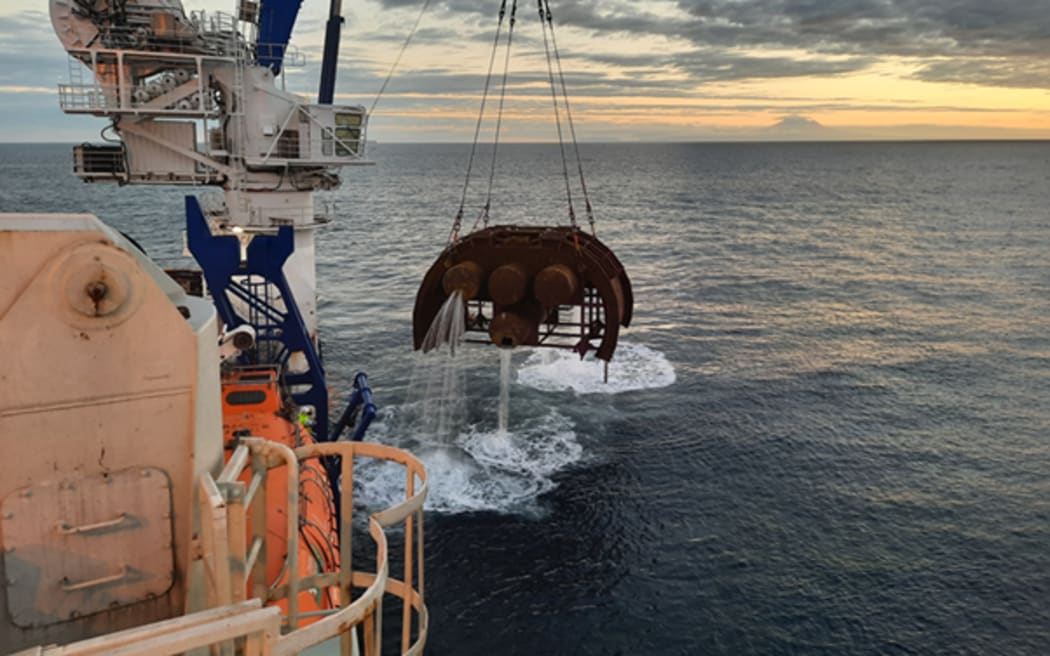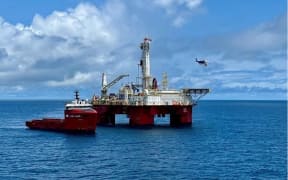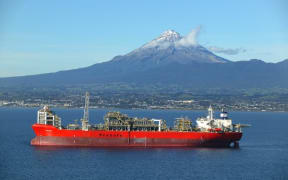
One of the mid-water arches being hauled onto the Sapura Constructor. Photo: MBIE / Supplied
* The first line of this story has been corrected to say $443m of taxpayer's money has been set aside for the oil field's decomissioning and the seventh line removes a statement that Lloyd Williams revealed information for the first time this week.
A total of $443 million of taxpayers' money has been set aside for the decommissioning the ill-fated Tui Oil Field - far higher than earlier estimates.
The Tui field was deserted in 2019 after the financial collapse of Tamarind Taranaki, leaving the Crown with the bill for its safe decommissioning.
The Ministry of Business Innovation and Employment set up the Tui Project to oversee the process in 2020.
Tui Project director Lloyd Williams said initially, Cabinet agreed to appropriate $154.6m to decommission the Tui Oil Field.
"These estimated costs were based on a 2015 study commissioned by the then owners of oil field. Cabinet noted at the time that the actual costs may differ depending on a range of factors, which were outside the Crown's control.
"There was an urgent need at the time to appropriate funds to comply with obligations under the Public Finance Act 1989 and form a Tui Project team to begin planning and preparing for the decommissioning."
Additional funding approved by Cabinet in May 2021 brings the project's budget to $443.4m, including contingency funding for unexpected costs.
"However, we expect the total costs to be substantially lower than this figure. The final costs will be confirmed over the next few months as part of the project's close-out."
Climate Justice Taranaki researcher Catherine Cheung was "shocked but not suprised" at the bill taxpayers were facing for decommissioning the Tui field.
"The government has always been playing down the real costs of the extractive industries environmentally. They make a mess and then they walk away."
Climate Justice Taranaki was one of a number of groups which campaigned for changes to the Crown Minerals Act to make it more explicit that companies were responsible for decommissioning costs.
An ammendment to the act in 2021 introduced penalities if companies did not meet decommissioning requirements.
Companies who sold a permit or licence were now also responsible for its decommissioning in perpetuity, meaning if the current owner failed to meet its obligations, they would be next in line.
Tougher tests for permit acquisitions were also introduced.
Cheung feared the new government could revoke those provisions.
"But it looks like this fast-track bill could be reversing that taking away the protection again because the Crown Minerals Act is at risk of being watered down again.
"We've just heard the prime minister is so much backing the extractive sector and economic growth through this fast-tracking bill that is coming through this afternoon, it's crazy really."
Cheung said what her group wanted was no new oil or gas or coal or seabed mining permits to be granted.
"It's irresponsible, we can't keep doing it for economic growth. Making money off nature, off the environment is economically suicidal."
Meanwhile, Williams said the increase in total expected costs was due to a range of factors such as:
- Delays between production ceasing and demobilisation, generating additional costs to retain the floating production storage and offloading vessel (FPSO) in the field and associated operating and maintenance costs over the course of the contract;
- Escalation in the daily market rates for vessels;
- Inclusion of additional activities to meet good environmental and operational safety standards (e.g. flushing of flow-lines and recovery of anchors);
- Potential changes in technical scope and vessels required;
- Delays or changes due to regulatory or market factors, such as rig/vessel availability;
- Accounting for adverse weather conditions.
Williams said the sudden departure of Tamarind Taranaki and transfer of decommissioning responsibility to Ministry of Business, Innovation and Employment (MBIE) required an urgent response to in order to ensure the ongoing safety and regulatory compliance of the Tui Field operation.
And the project had not been without its challenges, he said.
- A fast-track agreement had to be reached with the BW Umuroa, the owner of the FPSO, to remove it from the field during Phase One of the decommissioning project;
- Phase Two - removal of subsea infrastructure - and Phase Three - plugging of the wells - required marine consents from the Environmental Protection Authority causing delays with Phase Two beginning as soon as consents were available in March 2023 followed by Phase Three the following year;
- Phase Three, the plugging of wells, was the technically most demanding project and took about two months longer than expected.
"Despite this, the final phase of the project, which involved residual tasks from the previous phases, has now been completed meaning the offshore decommissioning activities have been completed within the original schedule," Williams said.
Last week, MBIE announced the last of the subsea infrastructure had been removed from the ocean.
In February the Sapura Energy Australia, using its construction support vessel Sapura Constructor, cut and recovered the remaining two wellheads.
Earlier, Sapura had removed four mid-water arch systems. Each of these systems comprised a 60-tonne arch the size of two double decker buses, suspended on chains above a 100-tonne base.
"The Tui Project was set up four years ago and there's been an incredible effort behind the scenes, on and off the water, to decommission and remove about 7000 tonnes of infrastructure," Williams said.
"There's a high degree of technical difficulty with bringing these massive structures onboard. Sapura's whole campaign was expected to take significantly longer, so it's great to see it finished so efficiently and well ahead of schedule."



